NOTICES
November, 2014
Dec 21, 2015
On November 18 (Wed.), 2015, RCAPS welcomed Professor Morihiko Kinjo (Faculty of
Tourism Sciences and Industrial Management, University of the Ryukyus) to deliver
an RCAPS seminar entitled, "Issues on Tourism Macro Statistics.”
[Report by APM Professor Mariner Wang]
In his 70 minute seminar, Professor Morihiko Kinjo (Faculty of Tourism Sciences
and Industrial Management, University of the Ryukyus) talked about ①the current
situation and challenges of tourism on Okinawa, ②challenges and policies for
tourism on Okinawa, ③the Okinawa General Bureau’s efforts to promote tourism,
④whether or not the economic effect of tourism is overestimated by the
input-output model? ⑤whether or not TSA (Tourism Satellite Account) is useless.
Professor Kinjo first explained, using graphs, the current situation and challenges
of tourism on Okinawa; then showed the transition in the number of inbound tourists
and revenues from tourism, the average duration of stay, and the average amount
consumed by per tourist; and concluded by discussing the future and challenges of
tourism on Okinawa (how to extend duration of stay, expand foreign tourists, and
increase amount consumed per tourist), using statistical data and graphs.
Specifically, he discussed efforts for achieving longer duration of stay and
increasing the amount consumed by tourists, measures for including Okinawan
culture in tour menus, infrastructure building to mitigate traffic congestion for
smooth transportation, economic effects from tourism on Okinawa, and international
standards of how to measure the economic impact from tourism.
In the Q&A session, there were many questions from the floor. 30 minutes was
allocated for the Q&A session but it was extended by 10 more minutes and the
seminar finished at 17:10.
The seminar was a substantial one. It was surely very informative for the attendees.
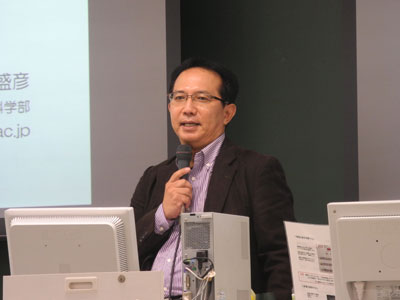
Professor Morihiko KINJO
- TOPIC
- セミナー
Dec 18, 2015
On Wednessday, December 9, 2015, RCAPS welcomed Professor Shin Kwang-Yeong(Department of
Sociology, Chung-Ang University) to deliver an RCAPS seminar entitled, "Multiple Social
Crises in South Korea: A Sociological Analysis". The seminar was held in English.
[Report by APS Professor Shinji Kojima]
Using tables and other visual representations, Professor Shin gave a talk on the rising
socio-economic issues in contemporary South Korea. He began by elaborating on the 1997
financial crisis and the ensuing neoliberal reforms undertaken by the Korean government.
One of the most significant consequences to the Korean society was the casualization of
work, with increasing number of workers employed under insecure, precarious
arrangements. Given the low level of social expenditure, more men and women of the
working age are suffering from unstable employment and of poverty. In conjunction with the
casualization of work, Professor Shin identified three crises the society is facing:
rapid aging, high suicide rate, and the dissolution of family as observed in the recent
rise of divorce rate. These phenomena have simultaneously led to the construction of an
unequal society. The Q&A session was a lively one. The audience raised questions that
compared their own country’s situation with the Korean case. Some students from Korea
were concerned with educational inequality, while others questioned the nature of inequality
from the standpoint of gender/women.
- TOPIC
- セミナー
Dec 17, 2015
The "Asia-Pacific Conference 2015" hosted by the Ritsumeikan Center for Asia Pacific Studies (RCAPS) was held from November 7 (Sat.) - 8 (Sun.), 2015.
- TOPIC
- カンファレンス
Nov 17, 2015
On Tuesday, October 27, 2015, RCAPS welcomed Mr Masazumi Ishii (Managing Director of AZCA, Inc.) to deliver an RCAPS seminar entitled, “Corporate Venturing and Open Innovation.” Mr Ishii talked about the current situation of Silicon Valley. The seminar was held in English.
[Report by APS Professor Yukihiko Nakata]
Mr Ishii obtained a Master of Science in computer science from Stanford University while he was engaged in system development at IBM Japan. After that, he joined McKinsey & Company, Inc. and worked as a management consultant. In 1985, Mr Ishii founded AZCA, Inc. in Silicon Valley, and has been doing consulting activities for Japanese companies that plan to advance into the US market. Also, since 2004, he has been involved in a venture capital company, Nonenti. Mr Ishii mainly talked about his experience in Silicon Valley.
First, he explained about the history and current situation of Silicon Valley. He explained that the ecosystem of Silicon Valley is made up from universities / research institutions, entrepreneurs, venture capitalists, incubators, and accelerators. As a result, 48% of investment in the US is happening in Silicon Valley, and world-renowned companies are clustered in Silicon Valley. In other words, the accumulation of money and knowledge has resulted in a virtuous circle.
Henry Chesbrough, an American organizational theorist, advocated the concept of Open Innovation, which creates values by organically combining ideas from inside and outside the company. The idea of Open Innovation is supporting the current status of Silicon Valley. There are two key factors to continue bringing about innovation: openness and tolerance for failure. Japanese companies lost their competitive edge in many areas in the global market due to lacking the concept of open innovation. The concept of corporate venturing that actively uses external resources is important for companies.
After this RCAPS Seminar, Mr Ishii also delivered a lecture to member companies of the semiconductor cluster in Oita Prefecture about the prospects for semiconductor-related companies from the viewpoint of Silicon Valley.
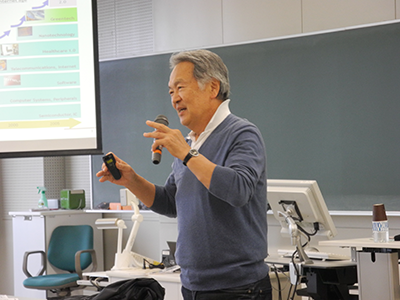
Mr. Masazumi Ishii
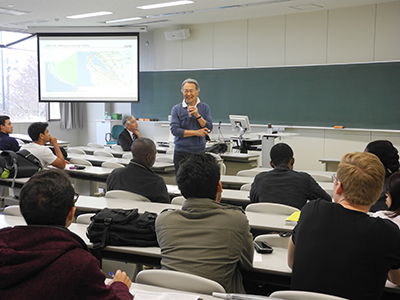
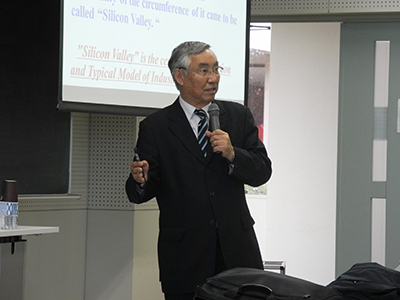
Chair:Professor Nakata Yukihiko(APS, APU)
- TOPIC
- セミナー
Nov 17, 2015
On October 21, 2015, RCAPS welcomed Mr Ryota Matsuzaki (CEO, Kibidango, Inc.) to deliver an RCAPS seminar entitled, "From Rakuten to Kibidango: Crowdfunding as Viable Tool for Entrepreneurs.”
[Report by APS Professor Yukihiko Nakata]
In the beginning of the seminar, Professor Nakata explained cloud innovation. As information technology (IT) develops, social network services (SNS), social media, crowdfunding, and crowdsourcing have appeared. By utilising crowdfunding, a large number of people can become the main players in the crowd, and create and accelerate innovation. This has been called as crowd innovation and makes it easier to start businesses. Mr Ryota Matsuzaki talked about how crowdfunding is actually used and answered questions from the floor.
After working in the investment bank division of the Industrial Bank of Japan, Mr Matsuzaki established Rakuten with Mr Hiroshi Mikitani and four other members in 2000. Mr Matsuzaki was engaged in M&A in Rakuten Group and became independent in 2011. He was inspired by Kickstarter, the biggest crowdfunding service in the United States, which has made many great ideas into reality. He launched Kibidango, Inc. in Japan in February 2013.
Kibidango has supported 137 projects so far and has gathered 100 million yen. The company uses a method called “All or Nothing” in which, if a certain amount of target money has been raised in a certain period of time, funding support will be given. The success rate so far is 80%. One of the success cases is a camera bag, Ciclissimo, which looks like a messenger bag and allows for taking out a camera quickly. Ciclissimo attracted 6.55 million yen from 226 people. Another case is an artificial arm made using a 3D printer.
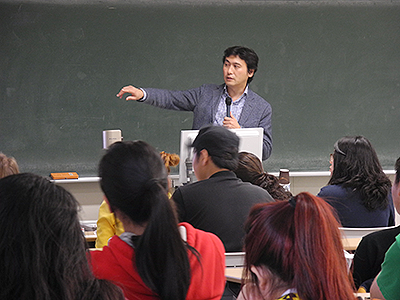
Mr. Matsuzaki Ryota
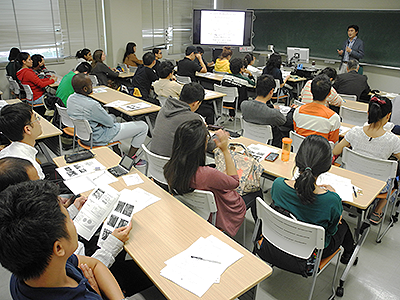

Chair:Professor Nakata Yukihiko(APS, APU
- TOPIC
- セミナー







